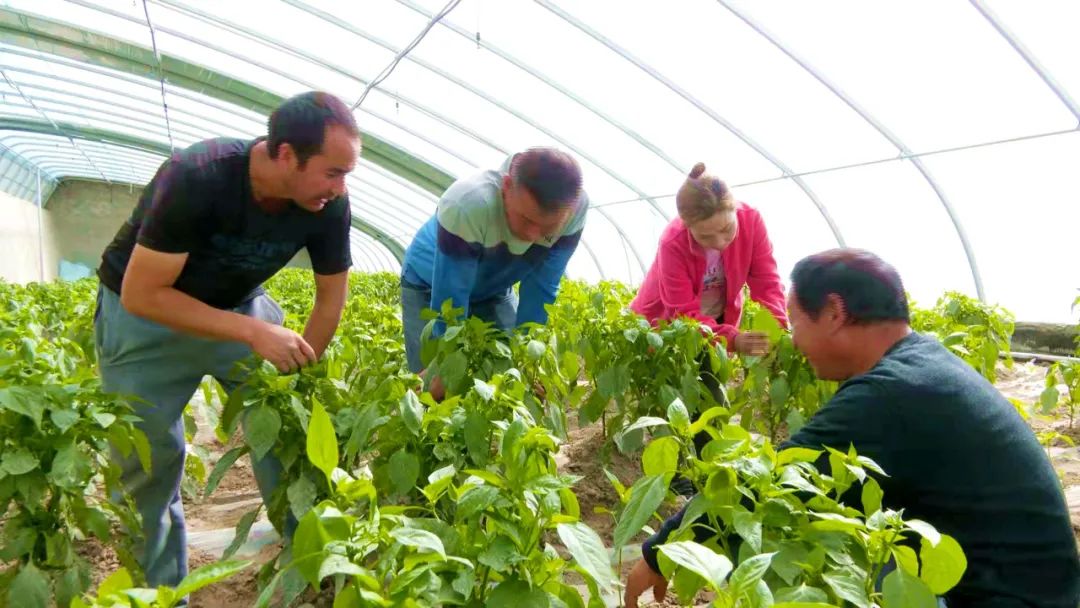Industrial park in Gobi boosts incomes for farmers


Shache county, in the Xinjiang Uygur autonomous region, has built an agricultural industrial park covering over 1,000 hectares in the Gobi Desert, greatly boosting local farmers' incomes.
Construction of the industrial park started this year. The park currently has 4,000 greenhouses, 200 hectares of forest and orchards, a breeding center with 150,000 sheep, a poultry farm with 2 million hens, and a pig farm with 30,000 pigs.
The park has also provided 3,000 jobs, with average annual salaries of more than 30,000 yuan ($4,710).
Shache is known for its vast expanse of desert and lack of arable land-with only about 1,300 square meters per capita. To help improve local incomes, the county government decided to make full use of the area and the abundance of sunlight in the desert. It began working with an agricultural company to lay out a plan to build a modern agro-industrial park covering an area of 1,333 hectares.
Wei Xingya, head of the industrial park, said to tackle the lack of planting soil in the Gobi, the workers transported soil from construction sites and channels dredged in downtown Shache to the greenhouses.
The authorities also paired technicians with local farmers to provide one-on-one technical support.
"The Gobi Desert enjoys rich sunlight resources. We've also applied micro-sprinkler irrigation technology and intelligent water and fertilizer data to achieve intensive and efficient production," Wei said.
"Every day, starting at 6 pm, trucks transport packed boxes of tomatoes to wholesale markets in surrounding cities. The Gobi industrial park not only does not take up existing arable land, but is also helping us realize our dream of turning the desert into an oasis, which has become a new path for our people to get rich."
He said one park employee can manage four greenhouses, and vegetables have been planted in 2,400 greenhouses so far.
"We're working hard to achieve our development goals of large-scale production and branded sales," Wei added.
Li Xuezeng, a technician from Shandong province hired by the park, said the abundant sunshine, the temperature difference and the irrigation system have all helped increase production efficiency.
"When efficiency increases, farmers' incomes increase. In about 45 days, two greenhouses can produce a conservative estimate of 6 metric tons of peppers, which will then go to market. With each kilogram selling for 5 yuan, the company will earn 30,000 yuan," he said.
Tawakkul Tohti is the manager of the park's greenhouses, overseeing 200 employees who work at the greenhouses and supervising water and electricity operations as well as planting conditions. He comes from Yinghuoyila, a nearby village, and started working at the park in May.
"I have learned a lot of technical skills from the technicians," he said. "Every day, there are trucks from Urumqi arriving at our industrial park to collect vegetables and deliver them to Gansu, Qinghai and Shaanxi provinces. I feel really proud.
"My basic monthly salary is 2,500 yuan. In November, I earned more than 3,000 yuan. My family's life is getting better and better. I want to do a good job in this place and build the Gobi Desert into a beautiful place."
Mantniyaz Ahat, another local farmer, has two children attending primary school in a nearby town. He and his wife came to work in the park in August and are responsible for cultivating peppers. He said one greenhouse is expected to produce 4 tons of peppers in three months.
"With the guidance of the technician, growing vegetables in the greenhouse is much easier than before," he said. "I can complete operations in two greenhouses in one morning."
- China's CR450: A new era of high-speed rail at 400 km/h
- TAN SUO SAN HAO to pioneer future of deep-sea exploration
- Xi's discourses on Chinese modernization published in Japanese
- Officials summoned over alleged garbage bin food served to students
- Caring hearts help to enhance quality special education
- Xi sends condolences to South Korean acting president over plane crash






































